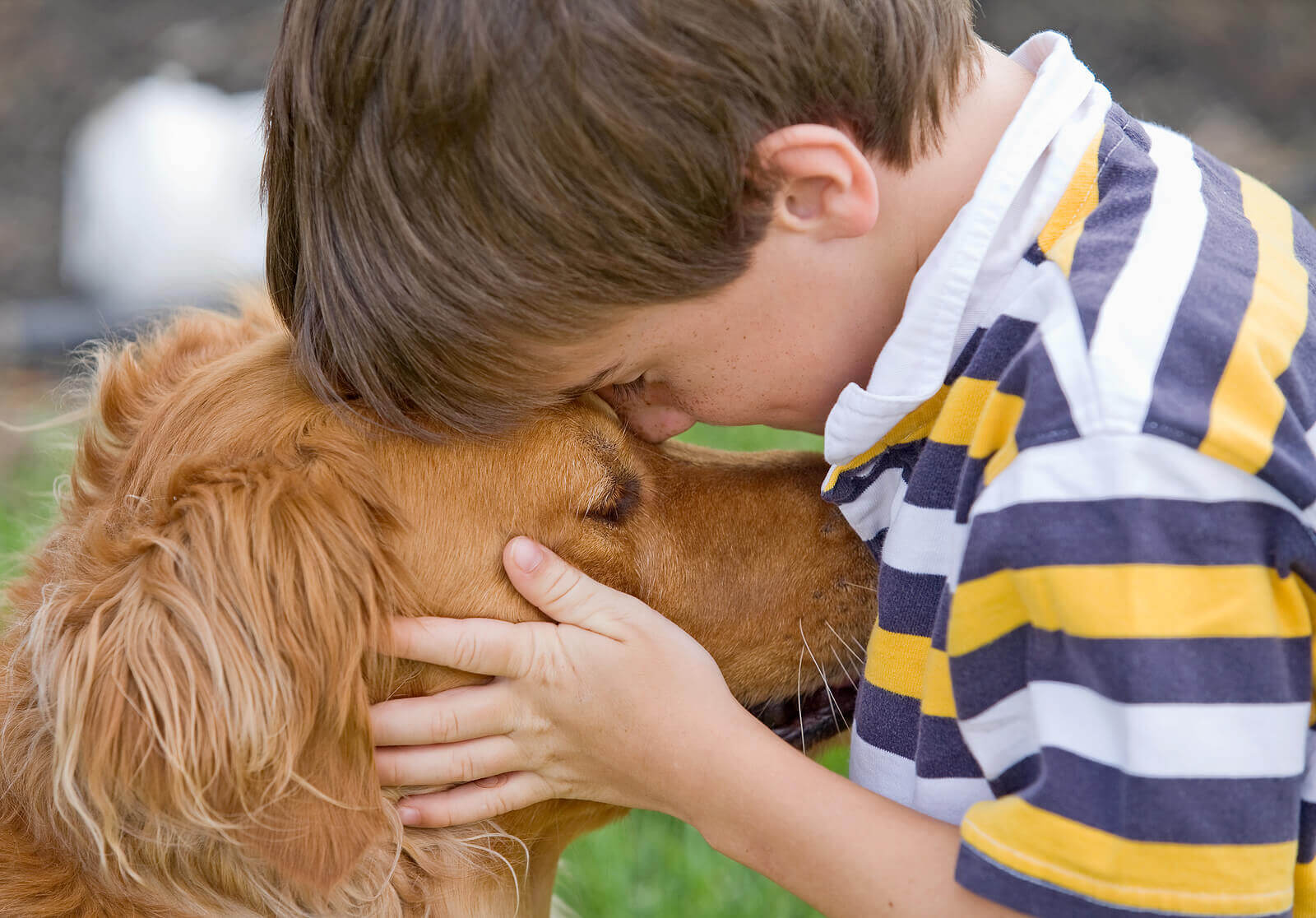Having a Dog Increases the Social and Emotional Development of Children

There are numerous studies that show how keeping pets contributes to the good health of little ones, even when there are allergies. In addition to physical health, pets, and especially dogs, improve social and emotional development in children. In the following article, we’ll tell you all about the study that supports this theory.
There are many families in the world that have pets in their homes. The truth is that these animals become part of the family and are loved very much thanks to all that they contribute on an emotional level. But beyond how rewarding it can be to live with animals, the benefits of having a pet in the home translate into greater well-being for all those who live with you. Keep reading to learn more.
Why owning a dog improves social and emotional development in children

Having a dog at home isn’t always easy for families, as keeping animals comes with many responsibilities and spending extra money for their care.
But people who know how wonderful it is to have dogs as part of their lives see these inconveniences as minor. The truth is, everything that having animals as pets offers is much greater than the burdens that their care entails.
As a result of this, researchers from the Department of Psychology of the Rovira i Virgili University (Catalonia, Spain) have prepared a study that was recently published in the journal Anthrozoös. The objective of the study was to find out if there are concrete differences in the social-emotional development of children who have dogs and those who don’t.
How the study was carried out
During the investigation, about 120 boys and girls between 3 and 5 years old from two public schools in this country were followed. Their parents had to answer certain questions in some questionnaires, which evaluated different points related to the development of the socialization of the minors.
For example, how the interaction of their little ones was with adults and with other children, how their ways of expressing emotions and feelings were, their ways of showing affection, their self-concept, the degree of cooperation, and the social role they had. Questions were answered orally.
As for the dogs, in no case did the study take into account those animals trained to take part in therapies or those that lived in the home of other relatives. What we were trying to find out was the relationship between living with dogs (the daily bond) and the impact on the development and health of children.
Proven: Having a dog benefits children’s development

After carrying out the study, researchers were finally able to conclude that having a dog as a pet in the house improves social and emotional development in children. In fact, the quantitative differences in the tests carried out on children with and without a dog were enormous, so it can be said that having a dog as a pet is a benefit in different aspects.
Of course, this doesn’t mean that not having dogs at home is a limiting factor for the child to achieve adequate social and emotional development. What the experts refer to is that the ownership of dogs is a positive factor for the acquisition of this domain. And the most important thing is that they’ve succeeded in showing that daily contact with the animal enhances socio-emotional skills in the early ages of life.
It should be noted that this study is one of the pioneers in the area and it’s essential to continue long-term follow-up to know what happens in the future. Among other things, to corroborate whether these benefits also carry over to adolescence and even adult life.
There are numerous studies that show how keeping pets contributes to the good health of little ones, even when there are allergies. In addition to physical health, pets, and especially dogs, improve social and emotional development in children. In the following article, we’ll tell you all about the study that supports this theory.
There are many families in the world that have pets in their homes. The truth is that these animals become part of the family and are loved very much thanks to all that they contribute on an emotional level. But beyond how rewarding it can be to live with animals, the benefits of having a pet in the home translate into greater well-being for all those who live with you. Keep reading to learn more.
Why owning a dog improves social and emotional development in children

Having a dog at home isn’t always easy for families, as keeping animals comes with many responsibilities and spending extra money for their care.
But people who know how wonderful it is to have dogs as part of their lives see these inconveniences as minor. The truth is, everything that having animals as pets offers is much greater than the burdens that their care entails.
As a result of this, researchers from the Department of Psychology of the Rovira i Virgili University (Catalonia, Spain) have prepared a study that was recently published in the journal Anthrozoös. The objective of the study was to find out if there are concrete differences in the social-emotional development of children who have dogs and those who don’t.
How the study was carried out
During the investigation, about 120 boys and girls between 3 and 5 years old from two public schools in this country were followed. Their parents had to answer certain questions in some questionnaires, which evaluated different points related to the development of the socialization of the minors.
For example, how the interaction of their little ones was with adults and with other children, how their ways of expressing emotions and feelings were, their ways of showing affection, their self-concept, the degree of cooperation, and the social role they had. Questions were answered orally.
As for the dogs, in no case did the study take into account those animals trained to take part in therapies or those that lived in the home of other relatives. What we were trying to find out was the relationship between living with dogs (the daily bond) and the impact on the development and health of children.
Proven: Having a dog benefits children’s development

After carrying out the study, researchers were finally able to conclude that having a dog as a pet in the house improves social and emotional development in children. In fact, the quantitative differences in the tests carried out on children with and without a dog were enormous, so it can be said that having a dog as a pet is a benefit in different aspects.
Of course, this doesn’t mean that not having dogs at home is a limiting factor for the child to achieve adequate social and emotional development. What the experts refer to is that the ownership of dogs is a positive factor for the acquisition of this domain. And the most important thing is that they’ve succeeded in showing that daily contact with the animal enhances socio-emotional skills in the early ages of life.
It should be noted that this study is one of the pioneers in the area and it’s essential to continue long-term follow-up to know what happens in the future. Among other things, to corroborate whether these benefits also carry over to adolescence and even adult life.
All cited sources were thoroughly reviewed by our team to ensure their quality, reliability, currency, and validity. The bibliography of this article was considered reliable and of academic or scientific accuracy.
- Dueñas, Jorge-Manuel., Dueñas, Jorge-Manuel., Forcada, Raquel., Duran-Bonavila, Silvia., Ferre-Rey, Gisela. (2021) Bullying: The Relationship Between Living with Dogs and Social and Emotional Development in Childhood. Anthrozoös, Páginas 33-46, vol. 34. Recuperado el 3 de septiembre de 2021 de https://www.tandfonline.com/doi/full/10.1080/08927936.2021.1878680
- Comité Nacional de Prevención de Lesiones de la Sociedad Argentina de Pediatría. Consenso: niños y mascotas. Arch Argent Pediatr 2020;118(3):S69-S106. Disponible en: https://www.sap.org.ar/uploads/consensos/consensos_consenso-ninos-y-mascotas-101.pdf
This text is provided for informational purposes only and does not replace consultation with a professional. If in doubt, consult your specialist.








